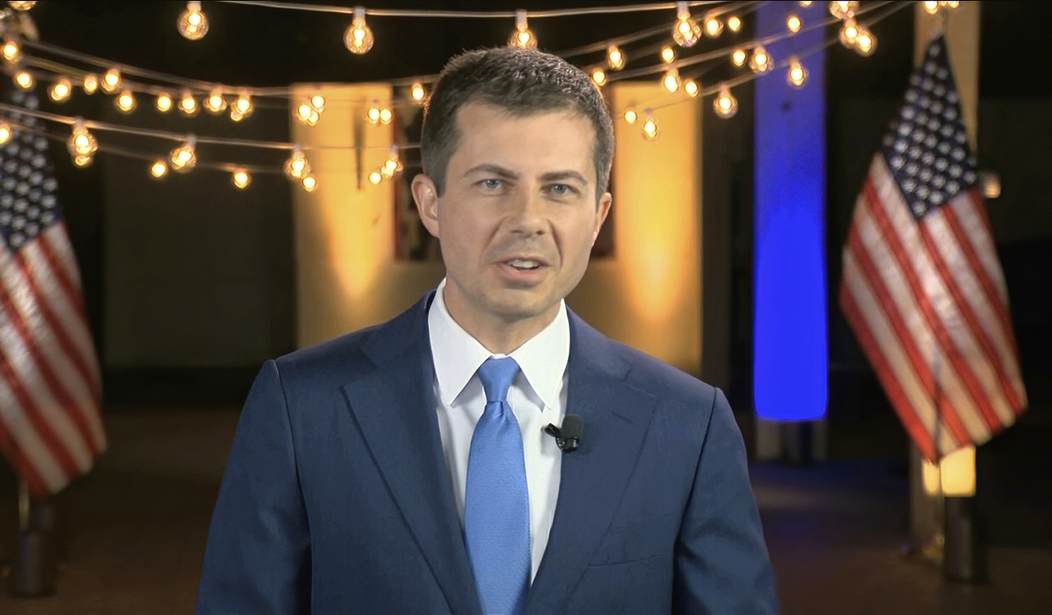Transportation Secretary Pete Buttigieg — of the department that issued the world’s most unfunny meme — raised some eyebrows earlier this month when he spoke about the recently passed infrastructure bill as a way to address racism.
In a Nov. 8 press briefing, Buttigieg said, “I’m still surprised that some people were surprised when I pointed to the fact that if a highway was built for the purpose of dividing a White and a Black neighborhood, or if an underpass was constructed such that a bus carrying mostly black and Puerto Rican kids to a beach, or that would have been in New York, was designed too low for it to pass by, that that obviously reflects racism that went into those design choices.”
Critics lashed out at Buttigieg for his assertion that racism is baked into our roads and bridges.
Gov. Ron DeSantis of Florida lashed out at the former mayor of South Bend, Ind., over the remarks.
“I heard some stuff, some weird stuff from the Secretary of Transportation trying to make this about social issues,” he said. “To me, a road’s a road.”
Tucker Carlson replied to DeSantis with, “Roads can’t be racist any more than toasters and sectional couches can be racist. They are inanimate objects. They’re not alive.”
Even Geraldo Rivera balked at the notion of using infrastructure to address the social policies of the past on Fox News when he remarked, “If you make infrastructure social welfare, what you’re going to get is nothing. At the end of the line, you’re going to have that money squandered.”
Related: The DOT’s Twitter Meme Doesn’t Just Offend Comedy — It May Also Be Illegal
Others rushed to Buttigieg’s defense, including Washington Post fact-checker Glenn Kessler, in a tweet he later walked back:
This is detailed at length in Robert Caro's Pulitzer Prize-winning book on Robert Moses, "The Power Broker." See especially pages 318-319: "He began to limit access by buses; he instructed Shapiro to build the bridges across his new parkways low — too low for buses to pass."… https://t.co/QmgpxU6Lag
— Glenn Kessler (@GlennKesslerWP) November 8, 2021
After all the brouhaha settled down some, Buttigieg took to MSNBC’s The Sunday Show to respond to his detractors.
“What we’re doing is we are reconnecting people who may have been disconnected or divided by discriminatory decisions in the past,” Buttigieg said in response to a question about how he would address critics. “That helps everybody. I don’t know why anybody would be against reconnecting people who have been divided by discriminatory decisions in the past.”
After doubling down on his earlier statements, albeit in a softer way, Buttigieg sort of walked back his initial statement.
“And again, the point is not to make America feel guilty,” the secretary admitted. “The point is to make America better and more equitable and more effective in moving people to where they need to go. The point of transportation is to connect, so if a transportation [sic] was ever used to divide, we have a responsibility, a moral one but also a very practical one, to fix it.”
Here’s the thing: Buttigieg may have had a bit of a point. There may well have been some highways, bridges, and other infrastructure projects that were built with nefarious intent on the part of racists in power. But that doesn’t mean that all of our infrastructure divides people more than physically.
The other problem with Buttigieg’s assertion is that no amount of government spending can undo the past. Big government is the default solution for Democrats, whether the problem occurred 20 minutes ago or 50 years ago. But no massive spending bill is going to solve the problems that can only be solved by changing hearts and minds. That’s what Buttigieg really gets wrong.










Join the conversation as a VIP Member